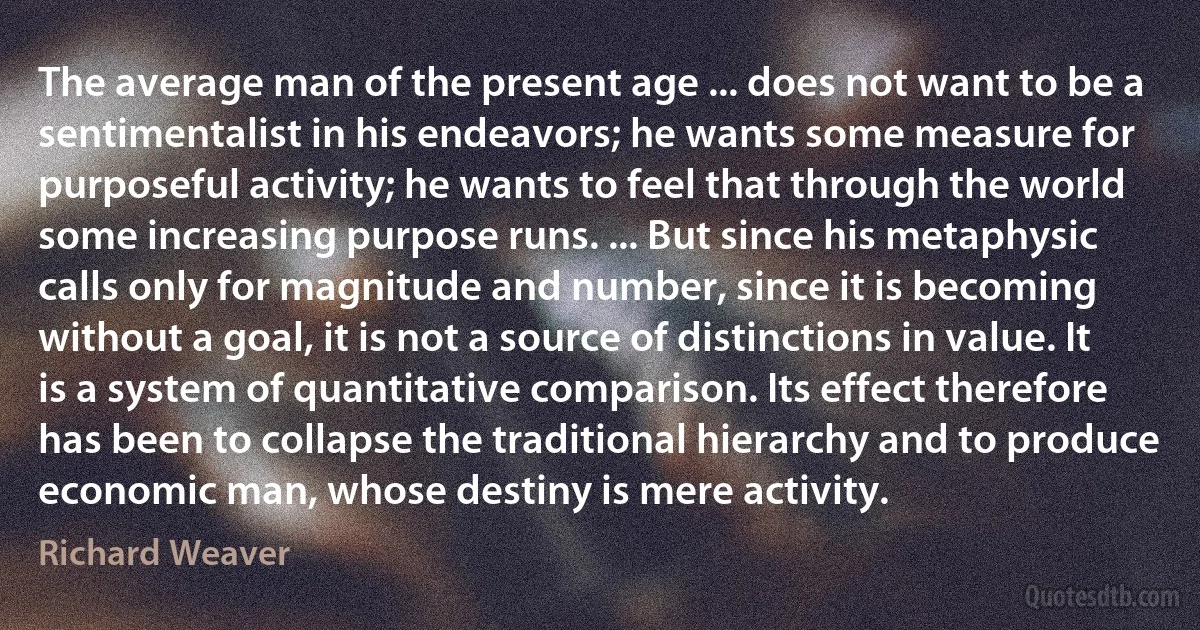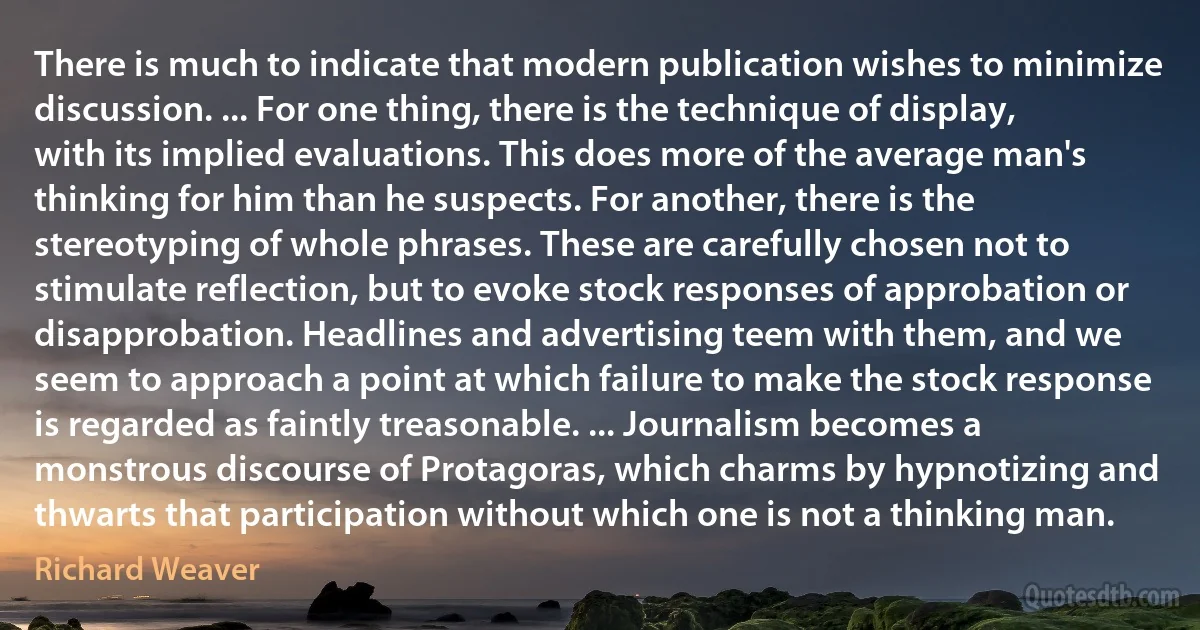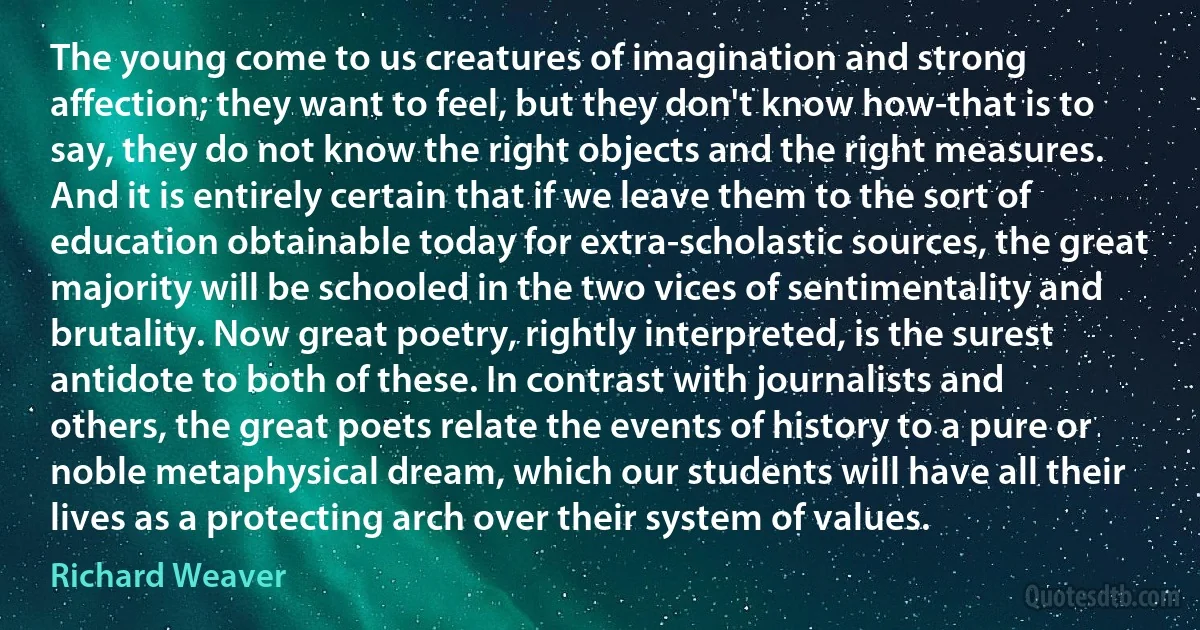Richard Weaver quotes - page 4
Since liberalism has become a kind of official party line, we have been enjoined against saying things about races, religions or national groups, for after all, there is no categorical statement without its implication of value, and values begin divisions among men. We must not define, subsume, or judge; we must rather rest on the periphery and display "sensibility toward the cultural expressions of all lands and peoples.” This is a process of emasculation.

Richard Weaver
The domination of becoming produces another sort of fragmentation, which may be called "presentism.” Allen Tate has made the point that many modern people to whom the word "provincial” is anathema are themselves provincials in the to an extreme degree. Indeed, modernism is in essence a provincialism, since it declines to look beyond the horizon of the moment, just as a countryman may view with suspicion whatever lies beyond his country.

Richard Weaver
The very possibility that there may exist timeless truths is a reproach to the life of laxness and indifference which modern egotism encourages. ... Ideas which have their reference to the periphery or individuum, to the particular in space and time, are false and stand in the way of integration.

Richard Weaver
Under the world view possessed by medieval scholars, the path of learning was a path of self-deprecation. ... An opposite conception comes in with Bacon's "knowledge is power.” If the aim of knowledge is domination, it is hardly to be supposed that the possessors of knowledge will be indifferent to their importance. On the contrary, they begin to swell; the seek triumphs in the material world (knowledge being meanwhile necessarily degraded to skills) which inflate their egotism and self-consideration. Such is a brief history of how knowledge passes from a means of spiritual redemption to a basis for intellectual pride.

Richard Weaver
In Greek fable, as in Christian, it is asserted that there is a forbidden knowledge which brings nothing into world but woe. Our generation has had ample demonstration of what that knowledge is. It is knowledge of the useful rather than the true and the good, of techniques rather than of ends.

Richard Weaver
In the absence of truth there is no necessity, and this observation may serve as an index to the position of the modern egotist. Having become incapable of knowing, he becomes incapable of working, in the sense that all work is a bringing of the ideal from potentiality into actuality. ... The modern worker does not, save in rare instances, respond to the ideal in the task.

Richard Weaver
Modern man ... when he looks at his daily newspaper ... sees the events of the day refracted through a medium which colors them as effectively as the cosmology of the medieval scientist determined his view of the starry heavens. The newspaper is a man-made cosmos of the world of events around us at the time. For the average reader it is a construct with a set of significances which he no more thinks of examining than did his pious forbear of the thirteenth century-whom he pities for sitting in medieval darkness-think of questioning the cosmology. This modern man, too, lives under a dome, whose theoretical aspect has been made to harmonize with a materialistic conception of the world. And he employs its conjunctions and oppositions to explain the occurrences of his time with all the confidence of the now supplanted discipline of astrology.

Richard Weaver
When Boswell confessed to Johnson that he feared some things he was entering in his journal were too small, the latter advised him that nothing is too small for so small a creature as man. This is good evidence that Johnson had achieved what I referred to as perspective, which carries with it a necessary humility. And while some may be startled to hear Mencken called a modest man, I can infer nothing but a real condor and humility from those bombastic and ironical allusions to himself which comprise much of the humor of his writings. The tone he adopted was a rhetorical instrument; he had faced his limitations.

Richard Weaver
The conservative realizes that many orthodox positions, once abandoned in panic because they were thought to be indefensible, are quite defensible in only one gives a little thought to basic issues. Surely one of these positions is the right of an individual or society to hold a belief which, though unreasoned, is uncontradicted.

Richard Weaver
Cultural freedom is in special danger today because so much of our life has been politicized. ... With governments which are popular and free, but which allow political sanction to pressures building up against certain types of cultural expression, ... the pressure ... moves to condemn on grounds which are social and political, and its desire is for uniformity, standardization, consolidation, and all the other features of Gleichschaltung, as it moves to protect from criticism and even from realistic depiction something over which people have become politically excited. In our American experience, these pressures have been largely social.

Richard Weaver
In his effort toward revivification of this sense [the sense for great art], the modern artist has not infrequently retired into himself; he has accepted isolation or even alienation. ... Sometimes the good has to go underground. ... The "revolutionary” artist ... has had the aim of saving himself from the surrounding forces of sentimentality and vulgarity. ... It is impossible to make a deal with these forces, and we should not be surprised if in striking back the artist has done so in ways even intended to be offensive. He has sometimes shown defiance and contempt toward those who would deny his level of seriousness.

Richard Weaver
If one benighted class of men begins by assuming that whatever is, is right, [contemporary radicals] begin by assuming that whatever is, is wrong. Had we to decide between these two-and I hope I make it clear that I do not think we have to decide thus-the latter would appear more blasphemous than the former because it makes a wholesale condemnation of a creation which is not ours and which exhibits the marks of a creative power that we do not begin to possess. The intent of the radical to defy all substance, or to press it into forms conceived in his mind alone ... is an aggression by the self which outrages a deep-laid order of things.

Richard Weaver
One of the first major steps in the direction of modern skepticism came through the victory of Occam over Aquinas in a controversy about language. The statement that modi essendi were replaced by modi significandi et intelligendi, or that ontological referents were abandoned in favor of pragmatic significations, describes broadly the change in philosophy which continues to our time. From Occam to Bacon, from Bacon to Hobbes, and from Hobbes to contemporary semanticists, the progression is clear: ideas become psychological figments, words become useful signs.

Richard Weaver
Man is constantly being assured that he has more power than ever before in history, but his daily experience is one of powerlessness. ... If he is with a business organization, the odds are great that he has sacrificed every other kind of independence in return for that dubious one known as financial.

Richard Weaver



